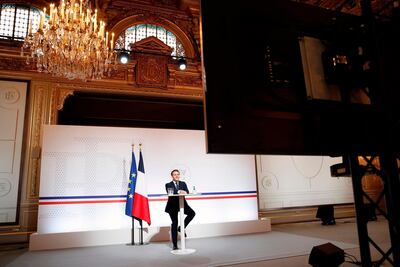French president Emmanuel Macron said coronavirus has reminded humanity of its vulnerability to disease and climate change, as he called on society to learn the lessons from the past year.
Mr Macron told the World Economic Forum by video link that the effects of the pandemic would be felt for “months and years”.
“The first thing to say is that you cannot think economy without thinking about human beings,” he said.
“It might seem rather banal to say that, but in all of our countries we've done something that was unthinkable before. We stopped all economic activities to save lives.”
Mr Macron said the past year showed the world that pandemics and climatic events were not a “distant idea”, and that they could have an effect on our everyday lives.
“We cannot build anything in the post-Covid world without learning the lessons from our experience,” he said.
“Our societies are vulnerable. Nature is reminding us we are vulnerable to a pandemic or climate events. The economy of tomorrow is strengthened by these lessons.”
Mr Macron said humanity was at “the start of a technological revolution”, with artificial intelligence and quantum computing likely to play a huge role in addressing these issues.
But it will also have an effect on democracy, illustrated by the riot at the US Capitol this month, he said.
Mr Macron said countries had not lived up to their Paris climate accord obligations but that now was a good moment to “revise upwards” their commitment to cutting carbon emissions.
“At this point, we have not lived up to our commitments, all of us," he said.
"So our top priority is to do our utmost to stay true to our commitments. There cannot be any freeloaders.
“When the US decided to leave the Paris Agreement in 2017, there was a major risk, but I see that the house of cards has not tumbled.”
Mr Macron also stressed the need to set up a global biodiversity agreement, echoing calls by EU Commission President Ursula von der Leyen earlier in the day.
“What we are doing for climate we need to do for biodiversity," he said.
"This will entail changes in agricultural production and in the very way that we consume and live."
Mr Macron said the world must move beyond the "Washington consensus", as he backed calls by Angela Merkel for a more multilateral approach.
“We need to find a new mode of co-operation between states," he said. "This was stymied by the previous US administration, which did not believe in it.
“I have a lot of hope for this new year with our American partner, which I hope is about to re-engage with us."
Then and now: Davos in 2020 and 2021
Match info
Uefa Nations League A Group 4
England 2 (Lingard 78', Kane 85')
Croatia 1 (Kramaric 57')
Man of the match: Harry Kane (England)
Jetour T1 specs
Engine: 2-litre turbocharged
Power: 254hp
Torque: 390Nm
Price: From Dh126,000
Available: Now
ONCE UPON A TIME IN GAZA
Starring: Nader Abd Alhay, Majd Eid, Ramzi Maqdisi
Directors: Tarzan and Arab Nasser
Rating: 4.5/5
The biog
Job: Fitness entrepreneur, body-builder and trainer
Favourite superhero: Batman
Favourite quote: We must become the change we want to see, by Mahatma Gandhi.
Favourite car: Lamborghini
The biog
Hobbies: Writing and running
Favourite sport: beach volleyball
Favourite holiday destinations: Turkey and Puerto Rico
Key findings of Jenkins report
- Founder of the Muslim Brotherhood, Hassan al Banna, "accepted the political utility of violence"
- Views of key Muslim Brotherhood ideologue, Sayyid Qutb, have “consistently been understood” as permitting “the use of extreme violence in the pursuit of the perfect Islamic society” and “never been institutionally disowned” by the movement.
- Muslim Brotherhood at all levels has repeatedly defended Hamas attacks against Israel, including the use of suicide bombers and the killing of civilians.
- Laying out the report in the House of Commons, David Cameron told MPs: "The main findings of the review support the conclusion that membership of, association with, or influence by the Muslim Brotherhood should be considered as a possible indicator of extremism."
What is a robo-adviser?
Robo-advisers use an online sign-up process to gauge an investor’s risk tolerance by feeding information such as their age, income, saving goals and investment history into an algorithm, which then assigns them an investment portfolio, ranging from more conservative to higher risk ones.
These portfolios are made up of exchange traded funds (ETFs) with exposure to indices such as US and global equities, fixed-income products like bonds, though exposure to real estate, commodity ETFs or gold is also possible.
Investing in ETFs allows robo-advisers to offer fees far lower than traditional investments, such as actively managed mutual funds bought through a bank or broker. Investors can buy ETFs directly via a brokerage, but with robo-advisers they benefit from investment portfolios matched to their risk tolerance as well as being user friendly.
Many robo-advisers charge what are called wrap fees, meaning there are no additional fees such as subscription or withdrawal fees, success fees or fees for rebalancing.
On the menu
First course
▶ Emirati sea bass tartare Yuzu and labneh mayo, avocado, green herbs, fermented tomato water
▶ The Tale of the Oyster Oyster tartare, Bahraini gum berry pickle
Second course
▶ Local mackerel Sourdough crouton, baharat oil, red radish, zaatar mayo
▶ One Flew Over the Cuckoo’s Nest Quail, smoked freekeh, cinnamon cocoa
Third course
▶ Bahraini bouillabaisse Venus clams, local prawns, fishfarm seabream, farro
▶ Lamb 2 ways Braised lamb, crispy lamb chop, bulgur, physalis
Dessert
▶ Lumi Black lemon ice cream, pistachio, pomegranate
▶ Black chocolate bar Dark chocolate, dates, caramel, camel milk ice cream
More from Neighbourhood Watch


